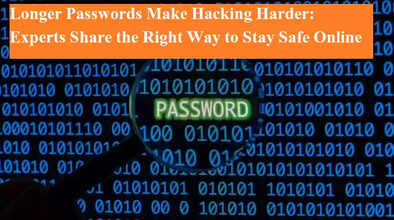Longer Passwords Make Hacking Harder: Experts Share the Right Way to Stay Safe Online

In today’s digital age, cybercrime is on the rise, and the first line of defense is a strong password. Yet, many users still make the mistake of choosing simple or repetitive passwords that hackers can easily crack. Experts warn that short and predictable passwords expose you to serious risks of data theft. So, how do you create a password that hackers struggle to break? Let’s find out.
Why password length matters
Earlier, an 8-character password was considered sufficient. But cyber experts say that’s no longer safe. Tom Smith, former VP at digital security provider Gemalto (now Thales), explains that hackers today use advanced cracking programs capable of testing up to 350 billion passwords per second. This means shorter passwords are no longer effective. According to Smith, users should now create passwords between 13 and 20 characters to ensure better protection.
What makes a password strong
A secure password is not just about length—it’s also about variety. Experts recommend mixing:
-
Capital letters and small letters
-
Numbers
-
Special characters
For example, instead of a weak password like happy777, you can transform it into something like H@pea!931. Similarly, you can take inspiration from a song lyric or a phrase. For instance, the Bollywood line “Tujhe Dekha To Jana Sanam, Pyar Hota Hai Deewana Sanam” can be shortened into TdtyjsPhhds—making it nearly impossible for hackers to guess. You can also use trusted random password generators like Security.org for added safety.
Don’t reuse the same password everywhere
One of the most common mistakes is using the same password across multiple accounts. Cybersecurity expert Dodi Glenn warns that if even one account is breached, hackers can access your other accounts—including email, social media, and even bank details—using that same password. Always create unique passwords for every account to minimize the risk.
Quick tips to stay secure
-
Use 13–20 characters in your password.
-
Mix uppercase, lowercase, numbers, and special symbols.
-
Avoid personal details like birthdays or names.
-
Never reuse the same password across accounts.
-
Use a password manager or generator to create and remember complex passwords.
Bottom line: Hackers are becoming faster and smarter, but with the right strategy, you can stay a step ahead. A long, unique, and complex password is your best defense against cyber threats.

